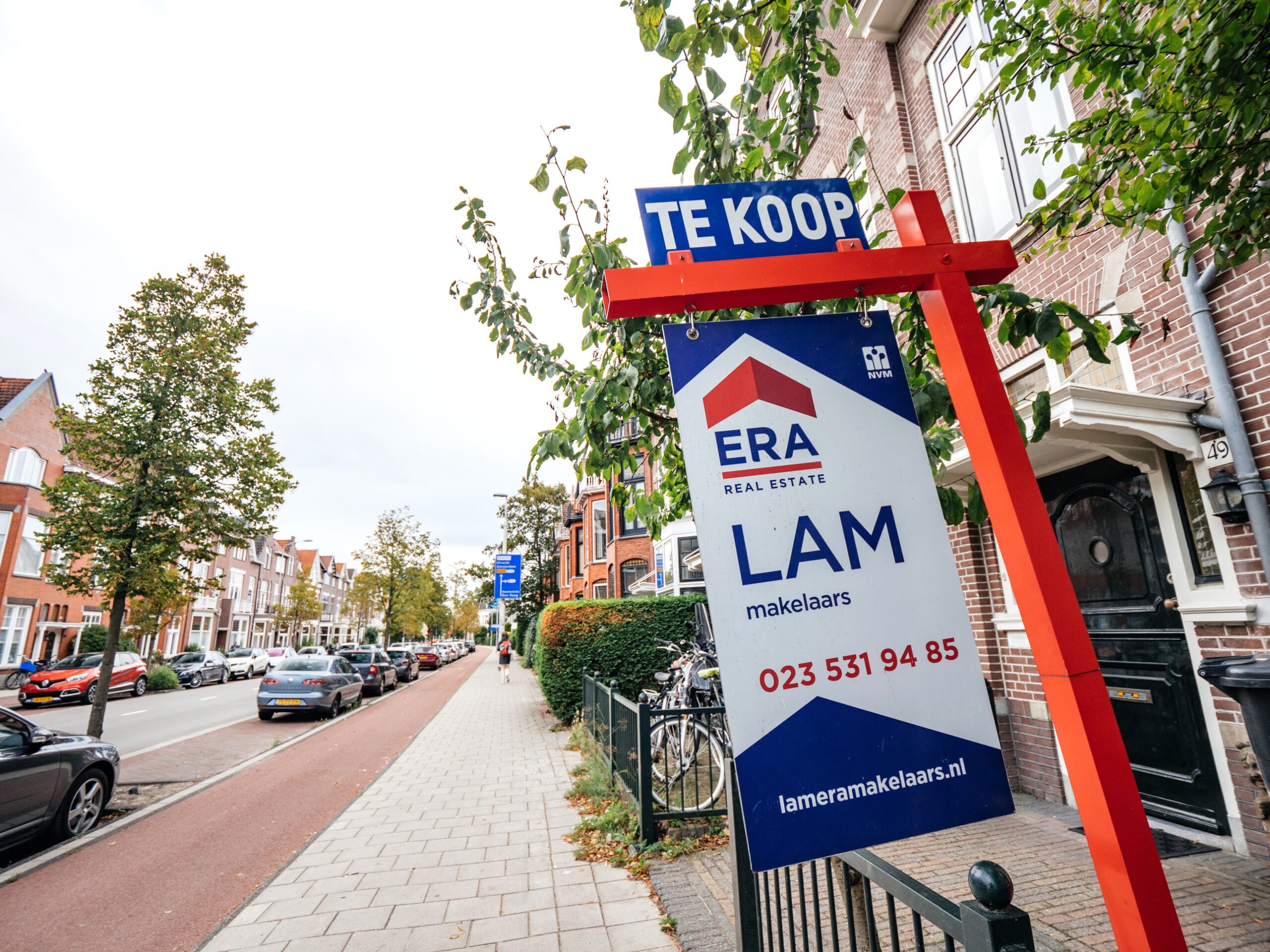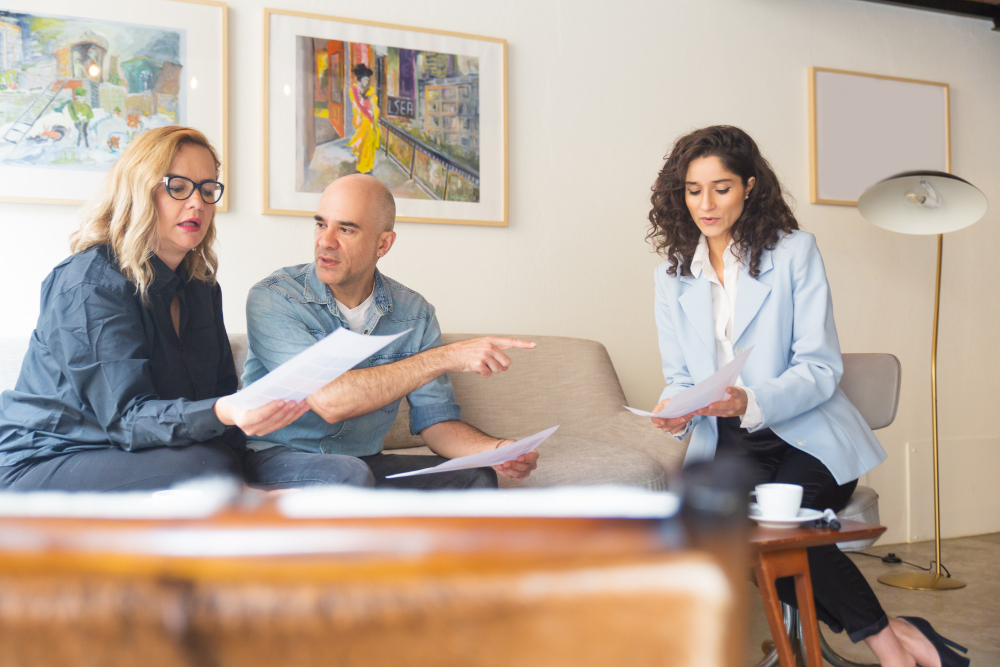Buying a house in the Netherlands? Congrats on taking that big step! Becoming a homeowner is a challenge for everyone but especially so for internationals who are navigating the journey without fluent Dutch.
You have a number of hurdles ahead of you — so let’s make the process much easier by decoding some of the key Dutch terms you should know.
1. Te koop
These magic words are exactly where your journey to buying a home in the Netherlands begins.

Te koop means for sale — and as soon as you see that fresh cardboard sign stuck to the window, you better run (not walk) to your computer.
Given that there are more home-seekers than houses in the Netherlands at the moment, these signs don’t tend to stay up for too long.
In fact, in 2024, it takes an average of just over one month for a house to sell in the Netherlands.
2. Hypotheek
This is another word that you are going to become quite familiar with once you dedicate yourself to buying a house in the Netherlands.
It’ll probably start to feature in your nightly sleep-talking segment — and all your everyday grown-up conversations for the next few months.
So, what does it mean? Mortgage! Yep, makes sense now, doesn’t it?
In need of a Dutch mortgage but not sure where to start? Set up a free consultation with ING’s experts to learn more about your mortgage options in the Netherlands.
3. Hypotheekakte
With every mortgage, there comes a hypotheekakte — a mortgage deed.
Think of this as a very important handshake between the person taking out the loan (you) and the person giving the loan (the bank). However, this handshake comes in the form of a legal document.
In this document, you metaphorically spit on your palms, shake hands, and give each other a nod that says, “I promise that if I can’t pay my mortgage, the loaner can take my property as collateral.”

The deed also contains the terms of the mortgage, such as when payments will be made, the mortgage rate, and the duration of the mortgage.
4. Taxateur
Unbelievably, a taxateur has nothing to do with taxes or taxidermy.
Instead, it’s an appraiser: a professional who will carry out a valuation of your potential home and determine if the house is worth what the sellers are asking.
You better familiarise yourself with the word because a taxateur is compulsory if you want to apply for a mortgage in the Netherlands.
5. Taxatierapport
Once the taxateur has used their magic to evaluate your home, they will present the taxatierapport.
This is a valuation report, in which you are usually presented with not only the estimated value of the house but also information such as its energy efficiency.
6. Ontbindende voorwaarden
While this term sounds quite scary to the non-Nederlander, its meaning is actually quite simple: resolutive conditions.

When buying a house, the buyer may present some resolutive conditions to the seller.
For example, they might say: “I will buy your house — but on the condition that we keep the furniture in the kitchen because it’s super gezellig and gorgeous.”
More common resolutive conditions include financing, such as: “I agree to buy your house unless the bank refuses to give me a mortgage.”
7. Schuld
Technically, “schuld” means “guilt” in Dutch.
However, in the context of buying a house, this actually refers to your debt — which, we promise, you don’t need to feel guilty about, no matter what those Dutchies say!
Most people have some form of debt hanging over them, and mortgage advisors understand this.
Don’t be discouraged. Telling your adviser that you have debt doesn’t necessarily mean your housing dreams are over.
8. Hypotheekrenteaftrek
While this may sound like a complicated and scary word, it will soon sound like music to your ears.
Hypotheekrenteaftrek translates to “mortgage interest deduction” in English.
READ MORE | Types of mortgages in the Netherlands: Dutch ‘hypotheken’ explained
Put simply, it means that with certain mortgage types, you can deduct the mortgage interest from your gross income.
As a result, you ultimately pay lower income tax at the end of each year. Take that, Belastingdienst!
Note: In the Netherlands, this is only possible if you have a linear or annuities mortgage.
9. Fiscaal aftrekbaar
However, mortgage interest is not the only thing that can be deducted from your gross income.
For example, mortgage advice or notary costs can also be fiscaal aftrekbaar, which means they are tax deductible.
10. Bouwdepot
A bouwdepot is essentially a construction deposit.
This is a loan that can be taken from your mortgage and used to finance future renovations on your home.

Most of the time, your bouwdepot is set up during the process of establishing your mortgage, but in some cases, you can also be late to the party and set it up when your mortgage is already established.
Most of the time, your bouwdepot is set up during the process of establishing your mortgage.
However, in some cases, you can still set it up when your mortgage is already established.
Want to know more about what you can do with a Dutch mortgage? ING has helped countless internationals secure a mortgage in the Netherlands. Schedule your free appointment today.
11. Notaris
A notaris is not a thing, but a person. As you will soon learn, when you buy a house in the Netherlands, there’s a lot of legal paperwork involved. This is where a notaris, meaning notary, steps in.
Everyone who buys a home in the Netherlands will get a notary involved in the process. Not only is it mandatory to enlist the services of a notary, it’s also extremely helpful.
They ensure that you dot your Is and cross your Ts — but more importantly, they’ll oversee the transfer of funds during the sale of the home.
12. Bankgarantie
Bankgarantie means, you guessed it, the bank guarantee!
When you buy a house in the Netherlands, you have to pay for the deposit on the house. However, sometimes, people don’t have the money readily available.
In this case, you can use a bank guarantee to reassure the sellers that the deposit will be paid.
READ MORE | The best banks in the Netherlands for internationals in 2024
Essentially, the bank vouches for you, and you don’t have to worry about using all your savings on the deposit.
13. Onder voorbehoud van financiering
If you find your dream house on Funda, but see that it’s onder voorbehoud van financiering then you need to manage your expectations.
This means that the house has actually already been sold — but it’s subject to financing.

Basically, someone else has snapped up the home. However, they still need to come up with the money to pay the sellers.
If they fail to do so by a certain date, the sale won’t go through, and the house will be back on the market again.
14. Studiefinanciering
In the Netherlands, students can take out a loan from the Dutch government in order to help cover the costs of their third-level education.
This studiefinanciering translates as student loans when you apply for a Dutch mortgage.
While you may never have taken out a student loan through the Dutch system, if you’re asked about studiefinanciering, you should mention any student debt you may have abroad.
Most homeowners in the Netherlands once had student debt, and while it depends on how high your balance is, the good news is that this debt doesn’t mean the end of the road for you.
15. NHG (Nationale Hypotheek Garantie)
We really recommend that you familiarise yourself with this term. The NHG is the Dutch National Mortgage Guarantee — and it does exactly what it says on the tin.
If you take out a mortgage with the National Mortgage Guarantee, you have a promise that the NHG will cover the remaining costs of your mortgage should you suddenly be unable to do so (due to losing your job, for example.)
16. Toestemming of vergunning van de gemeente
Sometimes, when you buy your dream home, it still comes with a few flaws that you need to change.
In this case, you may need toestemming of vergunning van de gemeente, which means permission from your local municipality.
Bear this in mind if a big fancy extension is part of your plans for your new home.
17. Makelaar
While this word may make you think of some obscure object you would find in your Dad’s toolbox, it actually refers to a realtor.

Many people looking to buy a home in the Netherlands will opt to have a realtor help them in both the search for a home and the negotiation of their bids.
The best part of a makelaar? They often have the inside scoop into homes for sale that haven’t hit housing websites yet.
18. Makelaarscourtage
The makelaarscourtage refers to the brokerage commission you pay your realtor for all their hard work.
In the Netherlands, this is usually a cost that is calculated based on the price of the house you buy or sell.
In most cases, unless you’ve agreed otherwise, this is only paid once there has been an agreement between the buyers and sellers.
19. Bouwkundig rapport
A bouwkundig rapport is an architectural report of the house.
While it sounds similar to a taxatierapport, the bouwkundig rapport looks at the structural integrity of the home.
It will highlight any potential faulty points in the house’s structure — which could save you some serious money in the long run (and we all know how much the Dutch love saving money.)
20. Overdrachtsbelasting
Ok, so you might not like the translation of this one. The overdrachtsbelasting is the transfer tax you pay when buying a house in the Netherlands.
For houses, the transfer tax amounts to a whopping 2% of the value of the property, so be prepared to factor this into your borrowing power calculations.
However, not everyone pays transfer tax in the Netherlands.
For example, if you are between the ages of 18 and 35 and buy a home worth less than €510,000, then you are eligible for an exemption from paying transfer tax — if you meet certain conditions.
21. Bedenktijd
One unique fact about buying a house in the Netherlands is that it involves a bedenktijd, which means “reflection period.”

The process of placing a bid on a house doesn’t exactly allow much room for thought.
However, once your bid is in and accepted, the reflection period allows three working days to reconsider whether or not you really want to buy the house — or if the seller really wants to sell.
This period kicks in after signing the purchase agreement and can definitely come in handy in this hot hot housing market in the Netherlands.
If you decide to withdraw your offer within this time frame — geen probleem. There will be no repercussions.
Are you ready to take your new-found Dutch knowledge and tackle the mortgage market? Goed! You’ve got this. 💪
Do you have any more Dutch terms that you would add to this list? Tell us in the comments below!
